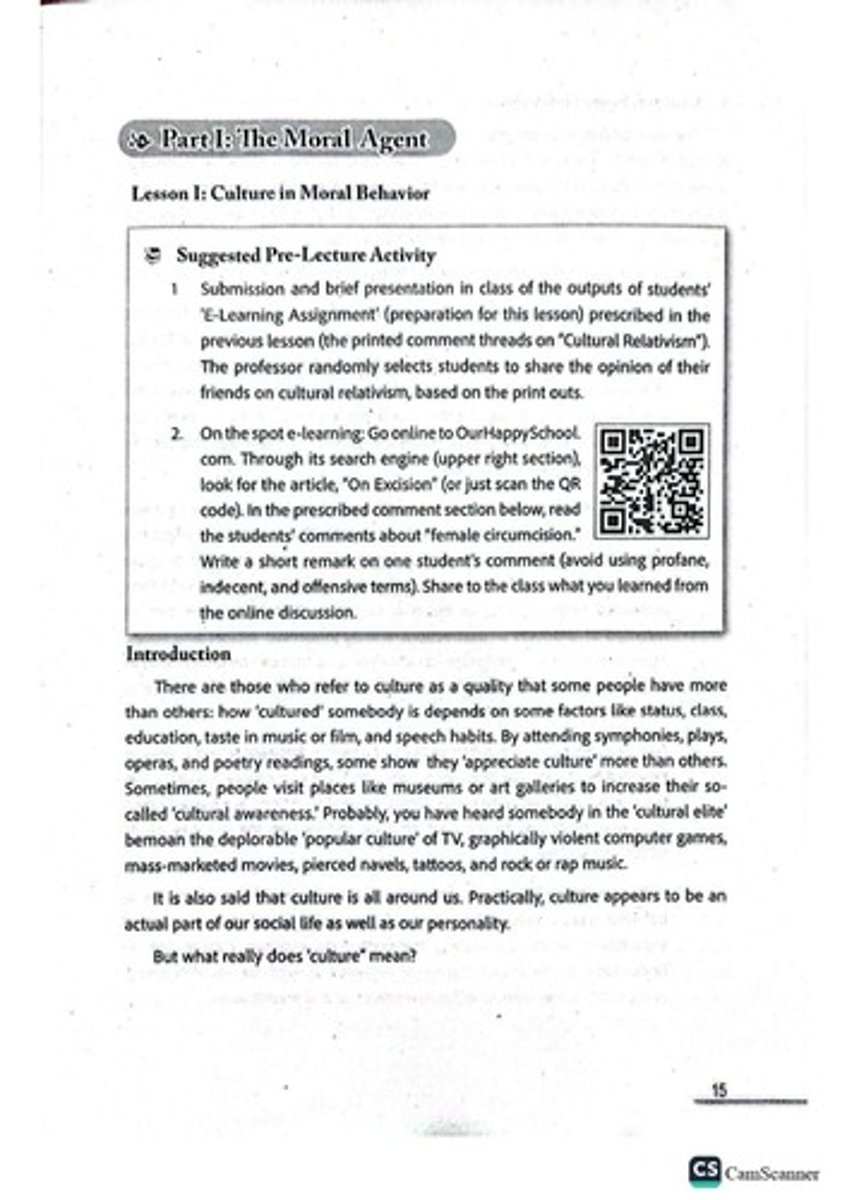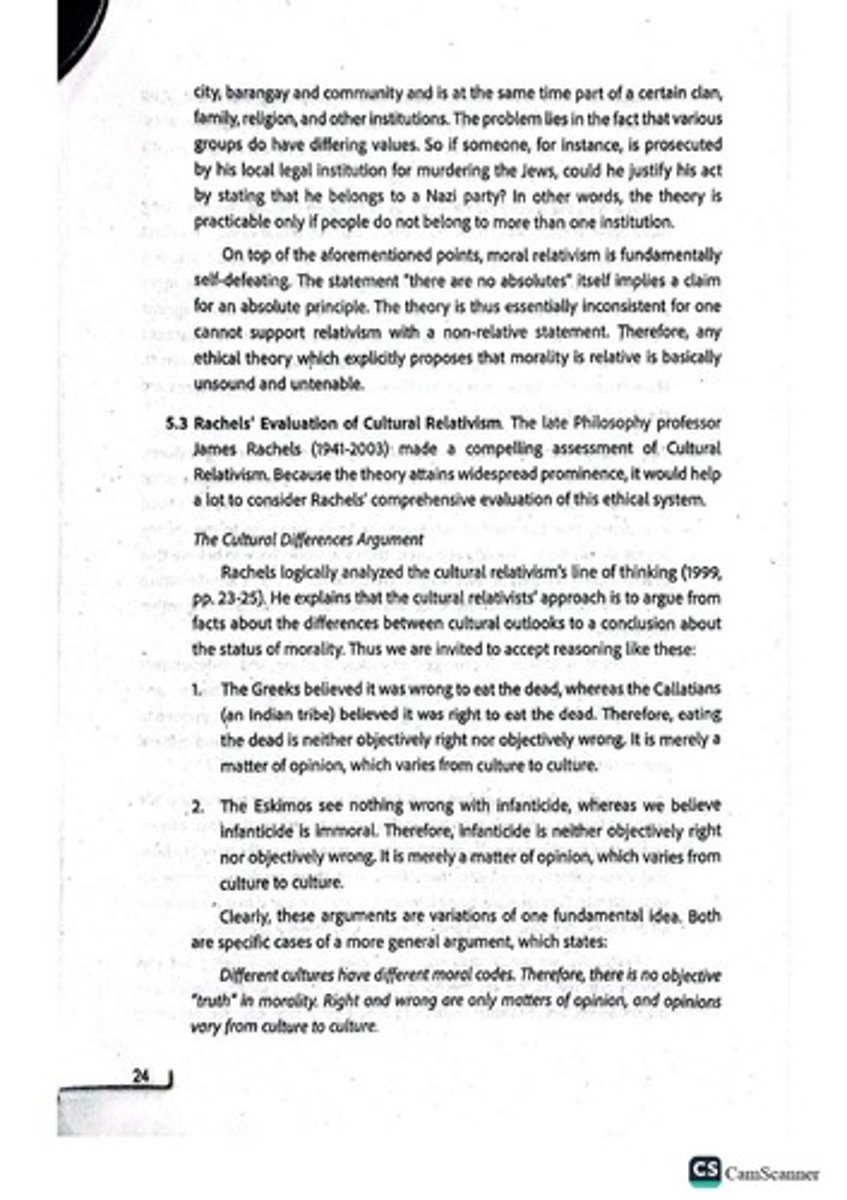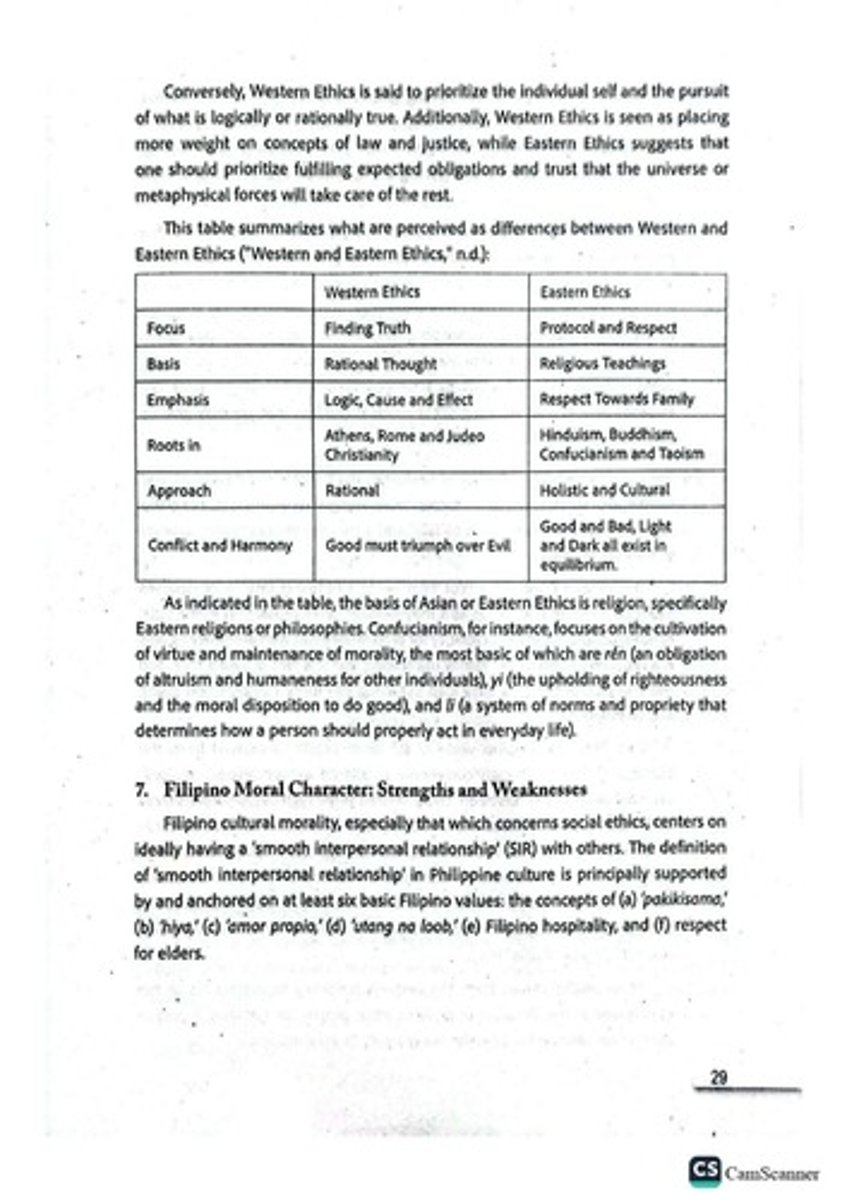Cultural Relativism and Moral Behavior: Key Concepts and Critiques
1/113
There's no tags or description
Looks like no tags are added yet.
Name | Mastery | Learn | Test | Matching | Spaced |
|---|
No study sessions yet.
114 Terms
What is culture in the context of moral behavior?
Culture encompasses the practices, beliefs, and perceptions of a society, influencing moral values and behaviors.

How is culture often perceived in society?
Culture is sometimes viewed as a quality that varies among individuals based on factors like status, class, education, and tastes.
What are some activities people engage in to show appreciation for culture?
Attending symphonies, plays, operas, poetry readings, and visiting museums or art galleries.
What does culture encompass according to one definition?
Culture includes acquired wisdom, personal convictions, values, attitudes, religious practices, and spatial interconnections.
How does culture govern behavior?
Culture transmits behavior through explicit and implicit patterns, reflected in tangible artifacts and traditional ideas.
What is the role of culture in moral behavior?
Culture serves as a 'way of life' that includes moral values, beliefs, and behaviors passed down through generations.
How do individuals learn moral values?
Moral values are learned from cultural transmitters like parents, teachers, novels, films, and television.
What is enculturation?
Enculturation is the process by which individuals learn the culture, including morality, of their society.
What do social convention and social conditioning theories suggest about morality?
These theories propose that moral standards are learned culturally and are essentially social agreements or conventions.
What is meant by moral standards as social conventions?
Moral standards are viewed as agreements made by people, similar to other conventions learned through education and socialization.
What is the significance of social learning in moral development?
Social learning is crucial for acquiring knowledge and moral values from others within a group during childhood.
What is the relationship between culture and individual behavior?
Individuals are profoundly influenced by their culture, which shapes their thoughts, actions, and feelings.
How does culture affect the interpretation of morality?
Culture influences how individuals evaluate what is morally good or bad and what actions are appropriate or inappropriate.
What is the definition of culture in a broader sense?
Culture can be seen as the cultivation of behavior, encompassing learned experiences that are socially transmitted.
What elements are included in cultural knowledge?
Cultural knowledge includes attitudes, standards of morality, rules of etiquette, language, and beliefs about social interactions.
What is the impact of cultural transmission on moral behavior?
Cultural transmission affects moral behavior by instilling shared values and norms that guide individuals' actions.
What does it mean to say culture is a collective body of acquired knowledge?
It means that culture consists of the traditions and behaviors recognized and practiced by a specific group over generations.
How does culture relate to moral accountability?
Culture shapes the understanding of moral accountability by establishing the norms and expectations within a society.
What are the implications of viewing morality as a human invention?
It suggests that moral standards could vary and change based on social agreements rather than being absolute.
What is the significance of symbols in culture?
Symbols in culture carry meanings that are learned and perpetuated through societal institutions, influencing behavior.
How does culture influence perceptions of reality?
Culture shapes individuals' perceptions of reality, including their beliefs about how the world works and social interactions.
What is the relationship between culture and moral values?
Moral values are integral to culture, as they are part of the shared beliefs and practices that define a group's way of life.
What does it mean to say individuals are products of their culture?
It means that individuals' thoughts, actions, and feelings are significantly shaped by the cultural context in which they grow up.
What is the role of communication in cultural transmission?
Communication is essential for passing along cultural knowledge, including moral values, from one generation to the next.
What is the impact of popular culture on perceptions of morality?
Popular culture can influence moral perceptions by introducing diverse values and behaviors that may challenge traditional norms.
What do some atheists, like Richard Robinson, believe about moral consciousness?
They maintain that it is an outcome of social conditioning.
In Richard Robinson's view, what is the original conscience of an individual?
A historical accident resulting from social influences, consisting of taboos and compulsions.
How do societal disapprovals contribute to the development of conscience?
As society disapproves of certain actions, individuals become aware of this disapproval, leading to a habit that functions as conscience.
What distinguishes learned behaviors from social conventions according to the text?
Some learned behaviors, like mathematical operations, are considered real truths, while social conventions can vary widely.
What is C. S. Lewis's argument regarding the nature of moral law?
He argues that despite cultural differences, there is a common moral law that runs through all societies, distinguishing it from mere conventions.
What does C. S. Lewis suggest about the ability to compare moralities?
He suggests that we can measure one morality against another using a standard of real morality, indicating that some moral ideas are better than others.
What is the implication of moral progress according to the text?
Moral progress implies that some moral ideas are truer or better than others, allowing for the possibility of improvement in moral standards.
How does the text define moral law in relation to social conventions?
Moral law is not synonymous with social conventions; it exists independently of societal approval and can be objectively measured.
What is social conditioning theory's stance on moral obligation?
It suggests that moral obligation cannot be solely explained by social conditioning, as individuals may feel compelled to act against societal norms.
What role does intellect play in moral decisions according to the text?
Intellect, influenced by moral authorities, helps individuals remember and discern moral actions, but it does not dictate the sense of moral obligation.
What is cultural relativism in ethics?
A theory that holds ethical judgments originate from individual or cultural standards, denying any objective universal moral standard.
What do moral relativists believe about moral principles?
They believe that different moral principles apply to different individuals or cultures, and that moral standards can change over time.
How do moral relativists view all moral norms?
They view all moral norms as equally true and as mere preferences.
What is the relationship between moral relativism and moral subjectivism?
Moral relativism is compatible with moral subjectivism, as both suggest that moral judgments are based on individual or cultural standards.
What example does the text provide to illustrate cultural conventions?
In the Philippines, people are taught to keep to the right of the road, which could have been different in other cultures.
What does the text imply about the nature of moral truths compared to social conventions?
Moral truths are considered real and objective, unlike social conventions which can vary widely and are not universally applicable.
What is cultural relativism?
Cultural relativism is the belief that morality is defined by what is socially approved by the majority in a particular culture.

How does cultural relativism view acts deemed ethical or unethical?
An act is considered ethical in a culture that approves of it and immoral in one that disapproves.
What do cultural relativists believe about moral disagreements among societies?
They believe that societies fundamentally disagree about ethical issues, leading to the conclusion that morality differs across cultures.
What is the stance of cultural relativism on universal moral truths?
Cultural relativism posits that there are no universal truths in ethics; moral truths are culture-bound.
What is the implication of defining morality as a product of culture?
It implies that there are no objective values and that ethics is merely a matter of societal convention.
How do advocates of cultural relativism view their own culture's moral code?
They see their own moral code as one among many, with no special status.
What attitude does cultural relativism encourage towards other cultures?
It encourages an attitude of tolerance towards the practices of other cultures.
What is one positive lesson learned from ethical relativism?
It promotes tolerance, which is necessary for coexisting peacefully in a diverse society.
What is a significant ethical fault of cultural relativism?
It can lead to morally questionable conclusions, such as justifying harmful practices if they are socially approved.
What contradiction exists within cultural relativism regarding tolerance?
It is contradictory to promote tolerance while asserting that no culture is morally superior, as this implies a standard for tolerance.
What is the cultural differences argument as described by James Rachels?
It states that because different cultures have different moral codes, there is no objective truth in morality.
Why is the cultural differences argument considered unsound?
The conclusion that there is no objective truth does not necessarily follow from the premise of differing beliefs.
What example does Rachels use to illustrate the flaw in the cultural differences argument?
He compares differing beliefs about eating the dead among cultures, questioning if disagreement implies no objective truth.
What does cultural relativism discourage in terms of ethical decision-making?
It discourages analytical thinking and independent decision-making by promoting uncritical compliance with social norms.
What is a practical issue with cultural relativism in a multi-faceted society?
Individuals belong to multiple overlapping groups with differing values, complicating the application of cultural relativism.
How does moral relativism contradict itself?
The statement 'there are no absolutes' itself implies an absolute claim, making the theory inconsistent.
What does cultural relativism suggest about practices like racism and oppression?
It suggests that such practices could be considered morally acceptable if they are socially approved in a culture.
What does cultural relativism teach about traditional practices?
It teaches that traditional practices should be followed uncritically, which can lead to ethical issues.
What is the relationship between cultural relativism and open-mindedness?
Cultural relativism encourages open-mindedness by prompting individuals to consider other cultures as different rather than wrong.
How does cultural relativism affect the perception of one's own moral beliefs?
It leads individuals to view their beliefs as conventional rather than absolute or universally correct.
What is the role of folkways in cultural relativism?
Folkways are seen as the basis for morality, with tradition serving as its warrant.
What does cultural relativism imply about ethical standards?
It implies that ethical standards are not universal but vary significantly between different cultures.
What is one criticism of cultural relativism regarding moral progress?
It fails to account for the possibility of moral progress or improvement across cultures.
What does cultural relativism suggest about the moral status of different societies?
It suggests that no society is morally superior to another, which can lead to ethical paralysis.
Why is the argument that beliefs about the shape of the earth are merely opinion considered unsound?
Because it suggests that all beliefs are equally valid, ignoring the possibility of objective truth.
What does Rachels argue about the disagreement among cultures?
Disagreement does not imply that there is no objective truth; it may reflect differences in belief systems rather than values.
How does Rachels illustrate the difference in values between cultures?
By using the example of a culture that believes it is wrong to eat cows due to their belief in reincarnation, showing that values may not differ fundamentally.
What factors contribute to the customs of a society according to Rachels?
Values, religious beliefs, factual beliefs, and physical circumstances.
What is the significance of the Eskimo practice of infanticide?
It highlights how harsh environmental conditions can lead to practices that may seem morally different but are rooted in survival needs.
Why do Eskimos prefer to dispose of female infants?
Because male hunters are essential for food provision, and maintaining a balance in the population is crucial for survival.
What does Rachels say about the commonality of adoption among Eskimos?
Killing infants is a last resort; adoption is a common practice when conditions allow.
How do the Callatians' funerary practices challenge cultural relativism?
Their practice of 'eating our fathers' can be seen as a sign of respect, indicating that cultural practices may share underlying values.
What are some negative consequences of taking cultural relativism seriously?
It prevents moral criticism of harmful practices, simplifies moral judgments to societal standards, and undermines the concept of moral progress.
How does cultural relativism affect the perception of moral progress?
It suggests that changes in societal morals cannot be judged as progress since all customs are valid within their cultural context.
What is a key distinction between Eastern and Western ethics?
Eastern ethics emphasizes societal and familial expectations, while Western ethics focuses on individualism and the pursuit of truth.

What does Rachels argue about the implications of cultural relativism on social reformers?
Figures like Jose P. Rizal and Martin Luther King, Jr. may not be recognized as reformers under cultural relativism since their actions could conflict with their society's standards.
What does Rachels mean by saying that cultural relativism can make differences in values appear greater than they are?
It suggests that anthropological data can mislead by emphasizing customs over the shared values that underlie them.
What is the impact of cultural relativism on moral criticism?
It restricts the ability to criticize harmful practices, such as slavery or discrimination, as it claims all cultural practices are equally valid.
What is the relationship between cultural beliefs and ethical standards?
Cultural beliefs shape ethical standards, leading to variations in moral perspectives across different societies.
How does Rachels view the role of factual beliefs in shaping customs?
Factual beliefs, along with values and religious beliefs, play a significant role in determining the customs of a society.
What does Rachels suggest about the nature of moral truth?
Moral truth may exist independently of cultural beliefs, and the existence of differing opinions does not negate its objectivity.
Why is the idea of moral progress considered disturbing in cultural relativism?
Because it implies that past moral standards cannot be judged against current values, hindering the notion of improvement.
What is the significance of the statement 'we agree that we shouldn't eat Grandma'?
It illustrates that cultural differences often stem from varying beliefs rather than fundamentally different values.
What does Rachels argue about the harsh environments affecting moral decisions?
Harsh environments can lead to practices that may seem morally questionable but are necessary for survival.
How does cultural relativism simplify moral judgments?
It suggests that moral rightness can be determined solely by adherence to societal norms.
What is the implication of cultural relativism for understanding ethical disagreements?
It may lead to the conclusion that ethical disagreements are less significant than they appear, as they can arise from differing customs rather than values.
What is the primary focus of Western Ethics?
Finding Truth
What is the primary focus of Eastern Ethics?
Protocol and Respect
What is the basis of Western Ethics?
Rational Thought
What is the basis of Eastern Ethics?
Religious Teachings
What are the roots of Western Ethics?
Athens, Rome, and Judeo-Christianity
What are the roots of Eastern Ethics?
Hinduism, Buddhism, Confucianism, and Taoism
What approach does Western Ethics typically take?
Rational
What approach does Eastern Ethics typically take?
Holistic and Cultural
What does Confucianism emphasize in its ethical teachings?
Cultivation of virtue and maintenance of morality
What are the three basic virtues in Confucianism?
Rén (altruism), Yì (righteousness), and Lǐ (norms of propriety)
What does 'pakikisama' mean in Filipino culture?
Maintaining good public relations to avoid conflicts
What is the significance of 'hiya' in Filipino culture?
A feeling of shame or embarrassment related to losing face
What does 'amor propio' refer to?
Self-respect or self-esteem, sensitive to criticism